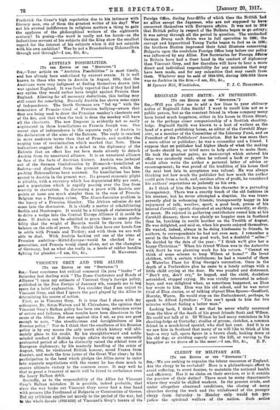AUSTRIAN POSSIBILITIES.
[To THIS EDITOR OP TER " SPECTATOR."] SIE,—Your article on "Austrian Possibilities" is most timely, and has already been underlined by current events. It is well known to those who were in Austria in August, 1914, that the Austrians were very indignant at finding themselves drawn into war against England. It was freely reported that if they had had any option they would rather have fought against Prussia than England. Allowing for all necessary deductions, this feeling may still count for something. Recently Austria has shown some signs of independence. The South Germans are "fed up" with the dominance of Prussia—tired of Prussian bullying—aware that they are being used to draw the Prussian monkey's chestnuts out of the fire, and that when the task is done the monkey will have all the chestnuts. The new Emperor is evidently not so easily acquiescent in these humiliations as Francis Joseph was. One recent sign of independence is the separate reply of Austria to the declaration of the aims of the Entente. The reply is couched in more moderate terms than that of Prussia, and modifies the rasping tone of recrimination which marked that Note. These indications suggest that it is a defect in the diplomacy of the Entente that an effort has not been made already to detach Austria from its unnatural alliance. It is an unnatural alliance in face of the facts of Austrian history. Austria was jockeyed out of the German Confederation by Bismarck—humiliated at Sadowa—and displaced from the premier position, which the pushing Hohenzollerns have assumed. No humiliation has been spared to Austria in the present war. Its present economic plight is pitiable, with a currency which has depreciated fifty per cent., and a population which is rapidly passing over the line from scarcity to starvation. in discussing a peace with Austria our points at issue are much simpler than in the case of Prussia. Belgium was a Prussian crime. The Alsace-Lorraine problem is the legacy of a Prussian blunder. The African colonies do not come into the discussion. It is chiefly a matter of rehabilitating Serbia and Montenegro. It would be a triumph of statesmanship to drive a wedge into the Central Europe Alliance if it could be done. If Austria can be admitted to peace there is some proba- bility that the weight of Bavaria would be thrown into the balance on the side of peace. We should then have our hands free to settle with Prussia and Turkey; and with them we are well able to deal. With Austria backing out one of the aims of Prussian ambition—Mittel-Europa—would be checked for a generation, and Prussia would stand alone, not as the champion of Germany, but as what she really is, a horde of robber bandits
lighting for plunder.—I am, Sir, &c., D. MACFADTIN.


































 Previous page
Previous page